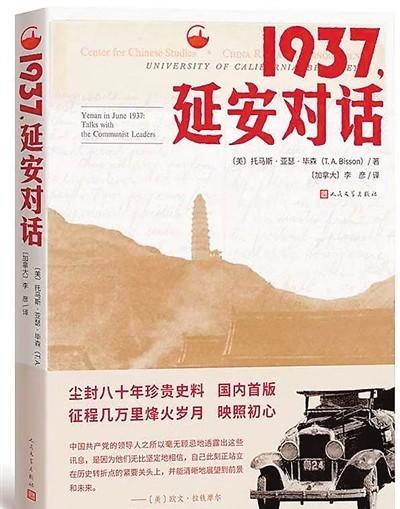
By Thomas Arthur Bissen and translated by Li Yan published by People's Literature Publishing House
From the English-Chinese bilingual novels "Red Duckweed" and "Snow Lily", to the English anthologies "Along the Silk Road" and "Rereading Bethune", to the documentary literature "Not Far Away" and "Ruler Of Heaven", Li Yan's creation and translation are always closely related to the history of Chinese and the red years. Her recent translation of "1937, Yan'an Dialogue", which she recently brought to us, has been hailed as a newly discovered "Red Star Shines on China". On the eve of the outbreak of China's all-out War of Resistance Against Japanese Aggression, thomas arthur Bissen, the author of the book, objectively reproduced the revolutionary practice and ideological theory of the Yan'an period of the CPC with a true and natural interview record, vividly portraying the extraordinary temperament of Mao Zedong and other revolutionaries of the older generation, forward-looking thinking and revolutionary optimism of the Chinese revolution.
"As a wanderer, I am always full of looking back and imagining the old garden, and I am even more shocked by the personality charm of the Chinese revolutionary leaders. After receiving an invitation from Contemporary magazine, I actively participated in the translation of "1937, Yan'an Dialogue". Li Yan said.
However, translation is not an easy task, especially such a red work, which requires not only a deeper understanding of the history of the Party, but also an understanding of how foreigners at that time expressed all this in English. As Professor Owen Latimer said in the preface to the 1937 Yan'an Dialogue, being a translator is a very unfortunate chore. Because the translator has to concentrate on every phrase, every phrase, to ensure the accuracy of the translation. In this regard, Li Yan frankly said: "Only from the perspective of personal interests, I would rather create my own works than translate other people's works. When creating, the mind can be free and informal, which is a kind of enjoyment; the translation of historical documents needs to be rigorous and meticulous, and the patience and sense of responsibility of the translator are strictly tested. "1937, Yan'an Dialogue" is a document involving the history of the Communist Party of China, and it is even more important not to do as you please when translating. ”
Li Yan gave an example, in the original work, When Bi Sen and Zhu De met, they mentioned a sentence, which was "Mao Zedong's famous saying." If you translate this sentence literally, it is "politics makes the muzzle of the gun shoot forward." When Li Yan was a child, he was familiar with the "Quotations of Chairman Mao" and had never seen this "famous saying." She speculates that the English phrase should refer to: "Our principle is that the party commands the gun, and the gun is never allowed to command the party." In order to verify her inference, Li Yan consulted domestic authoritative experts, and finally got verification and confirmation, and translated this sentence in its original taste.
Li Yan believed in strictly restoring the standard of "faith, da, and ya", and believed that the translation of red works should follow "faith, da, ya". She agrees with some scholars' interpretations of the relationship between the three: the words "faith" and "da" are interdependent, and the words "da" and "ya" are interrelated. "Faith" is the goal, "da" is the means, and "ya" is the auxiliary means of serving the "da". When translating red works, it is particularly necessary to emphasize rigorous accuracy (faith), naturalized readability (da), and literary and artistic writing and translation (Ya). This is fully reflected in the translation of the 1937, Yan'an Dialogue, which contains many idioms with Chinese characteristics, such as the rise of fame, cocooning oneself, and Chinese proverbs such as the front door driving the tiger and the back door entering the wolf. Li Yan enhances readability by incorporating symbolic Chinese vocabulary and idioms. The book also shows a large number of Shaanxi dialects and terms specific to the Chinese revolutionary years, such as the Red Devil, the Shaanxi-Gansu-Ningxia Border Region, and the Peasants' Mutual Aid Group.
The two-way translation of Chinese and foreign literature is an issue that Li Yan has paid attention to in recent years. In her opinion, translation is very important to tell Chinese stories well. "Many of China's modern and contemporary literary works reflect the industrious, courageous, tenacious, generous and patient, and compassionate feelings of the Chinese people, which are very worthy of translation and recommendation and introduction to the people of the world." It is necessary to increase the training of young students so that more people are interested and have the ability to devote themselves to the practice of translating Chinese and foreign literature. Li Yan said.
(The author is an associate professor at the School of Language and Communication, Beijing Jiaotong University)